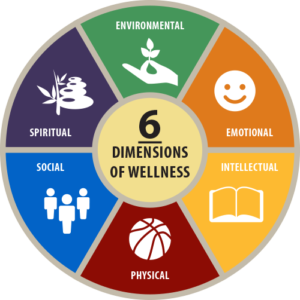
Your relationship isn’t the only place you should focus on getting more than just physical. A lot of media is placing a big focus on fitness, right? While I do believe that physical fitness is super important (I am a PE teacher after all), and I am glad it is being addressed in current media, I also think that most people have the wrong idea of what fitness truly is. You guys, I could stand on my soapbox all day and preach that true fitness is not having the perfect swimsuit body because I think that our society has a skewed perception of what it looks like to be healthy. I teach my kids at school and at home to think of fitness in terms of overall wellness and health instead of only focusing on physical appearance. Physical fitness is only one piece of the overall wellness and health puzzle. I like the idea presented in the Fitness for Life textbook that I use in my class (Personal Fitness: Looking Good and Feeling Good by Wiliams, Harageones, Johnson, & Smith (2005)) that was adapted from content originally developed by the United States Air Force. This idea presents six general components of fitness that are all closely tied together to create a healthy and “fit” individual.
Physical Fitness: The textbook referenced above defines physical fitness as the ability of an individual to; carry out daily tasks without becoming overly fatigued, physically handle emergency situations, and have sufficient energy to enjoy daily leisure activities. Even physical fitness isn’t just about looking good: it is determined by the condition of the cardiovascular system (resting heart rate), circulatory system (lung capacity), respiratory system (respiratory rate), muscular system (strength and endurance), degree of flexibility (to carry out daily tasks and remain injury-free), and percentage of body fat. The best indicators of physical fitness are not looks and weight: they are resting heart rate and body fat percentage.
Spiritual Fitness: I love the Air Forces’ definition of spiritual fitness: “The ability to adhere to beliefs, principles, or values needed to persevere and prevail in accomplishing a mission.” Isn’t living simply the pursuit of accomplishing one mission after another? How amazing would it be to be fit enough to “persevere and prevail” in all of life’s missions? Building solid beliefs, principles, and values are key components of having a sense of purpose and meaning in your life and are essential in building individual resiliency.
Mental Fitness/Intellectual: A simple Google search defines mental fitness as a “State of psychosocial well-being. It means having a positive sense of how we feel, think, and act, which improves our ability to enjoy life. It contributes to our innate ability to be self-determined.” Self-determination and happiness? Sign me up for anything that gives me more of those!
Emotional Fitness: A simple Google search defines emotional fitness as the “State wherein the mind is capable of staying away from negative thoughts and can focus on creative and constructive tasks. Being emotionally fit is the key to success in all aspects of life.” Now that is a powerful definition. Think about what we could accomplish if we could reach our full potential in emotional fitness and have control over our thoughts and focus.
Social Fitness: Mcconnell Air Force base follows a model of fitness similar to the one the others mentioned here and defines social fitness as; “Developing and maintaining trusted, valued friendships that are personally fulfilling and foster good communication, including the exchange of ideas, views, and experiences.” As human beings I think that communication and friendships are two of the most powerful assets we can possess. True friendships and positive relationships are what we can rely on when we need external support.
Environmental Fitness: In its study on resilience in the United States Air force, the RAND project defines environmental fitness as the “Knowledge, skills, and behaviors needed to successfully protect against stress associated with one’s environment or to successfully withstand the stressors that are encountered.” Our environment plays a big role in the stressors we encounter on a daily basis. We need to realize that we can control and create our environment to some extent and can also have a significant impact on the environment created for those around us.
Looking at health and fitness as a bigger picture and expanding our focus from just only physical fitness can help us feel more successful along our health journey. You might be surprised at how closely connected each of the components of fitness are, and when you improve in one area, another area will naturally benefit as well. That’s how I came to focus on doing small things in five areas of my life every day.